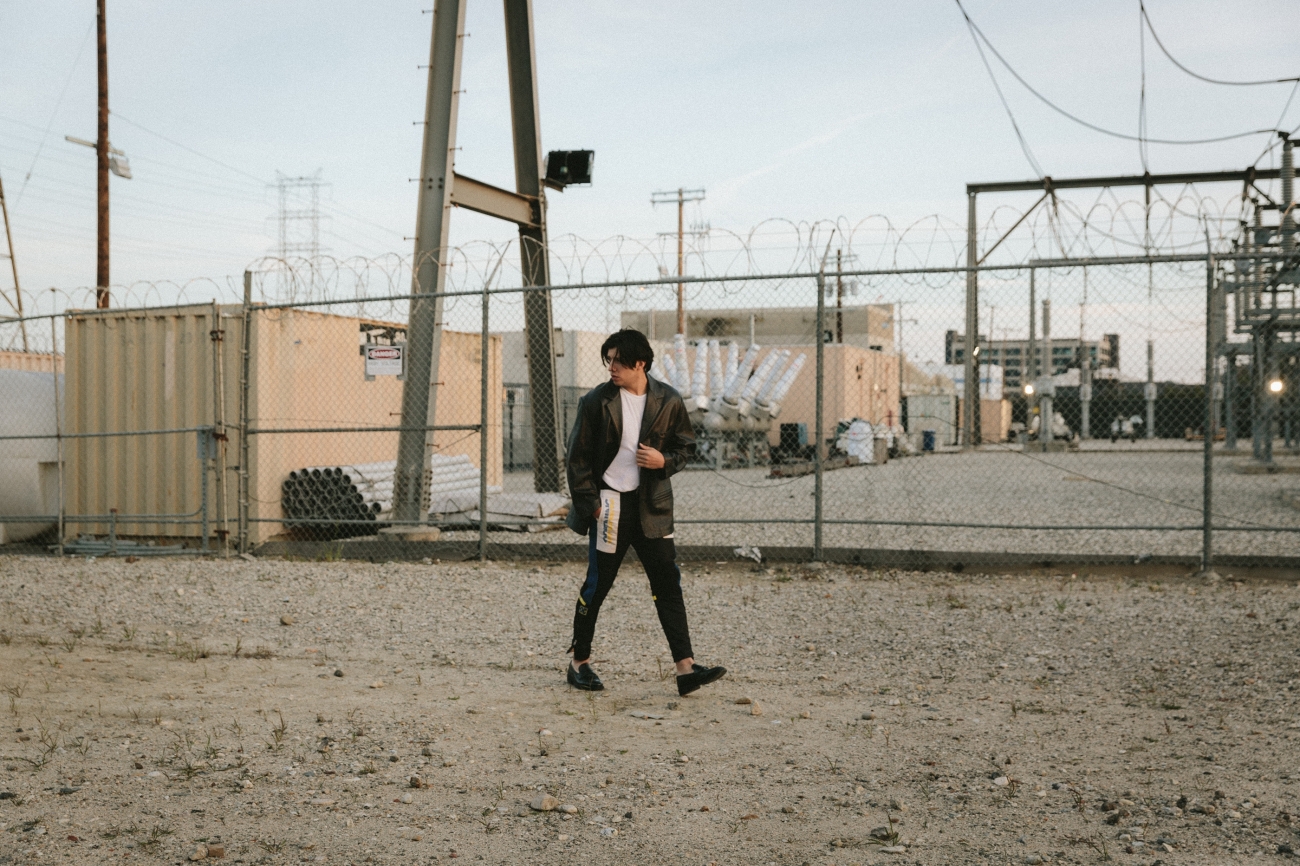Photography Rachael Wright
Fashion Jardine Hammond
Interview Sam Cohen
Grooming Nathaniel Dezan
Production Trevor Person
When I speak with Kevin Alves, I’m struck by how he speaks about his character in Yellowjackets as if Travis is a personal friend. The more we discuss the show, the more this realisation sinks in and starts to take hold of me. I’m fascinated by its unfolding because it directly challenges my notion of empathy. I had always known that empathy allowed you to understand something from someone else’s perspective even when you don't know them personally - but could that same ideology extend to a fictional person on-screen?
For Kevin, empathising with Travis is second nature - not just because Kevin spends so much time walking around in Travis’ skin, but because empathy is the underlying heartbeat in everything Kevin does. Whether it’s his approach to on-screen performances, or the way he carves out time every day for the people he loves, everything he applies himself to is gilded in this gold. Regardless of the subject we broach, his comments are filled with gratitude, kindness, and care. I gather that he’s the type of person others gravitate toward because he feels like the human embodiment of sunshine - which is fitting, as he wore a yellow sweatshirt for the duration of our chat.
Even though Los Angeles had been dealing with a deluge of rain preceding our conversation, Kevin expressed hopes that the weather would clear and the radiant rays would return soon. He was also hopeful that Travis may be able to face a similarly positive horizon over the course of Yellowjackets, even if things look bleak at the moment. Kevin’s empathetic outlook on Travis allows him to dig into the character in a way that feels truly human. He looks through the lens of loneliness and sees Travis for what he really is: A young boy, lost in the vast wilderness, figuring out who he is and the type of man he wants to be, all while trying desperately to simply survive. It’s the perfect storm of emotions, and Kevin seems poised to undertake the journey required to sail Travis toward calmer waters.
As someone who began his acting career much later than most, Kevin acknowledges how grateful he is to play such a pivotal role. His background in figure skating (and sports in general) allowed him to tap into parts of himself that shine through the TV every week. He spoke of how Travis is usually seen as a two-dimensional being, and his hope was to bring the character forward to a more multi-dimensional version of himself. Walking away from our conversation, I could see Kevin’s vision for his Yellowjackets counterpart - an exploration into what it means to be alone, and how someone can come out on the other side of that having grown into the person he was meant to be all along.
Yellowjackets season two is out now on Showtime.
You’re from the greater Toronto area, which is known for having this really great city atmosphere while also having a lot of greenery and open landscapes. Do you like the livelier end of the spectrum or do you prefer the quieter, more rural end?
At this point in my life, because my job gravitates to the lively side of things and going places and meeting people, I would say that in my personal time, I definitely gravitate towards the greenery. I love golfing, so anywhere there's a golf course, you'll find me. Or hiking. That's definitely why I've actually enjoyed shooting in Vancouver a lot with this show, because even though you're in the city, you're 30 minutes away from mountains, you're 30 minutes away from hiking, from trails, from lakes. So that's been a really nice balance between Toronto and LA.
I read in a previous interview that, since you’re close to so many beautiful things in Vancouver, you tend to do a lot of group trips when you’re filming Yellowjackets. Do you think that helps you all balance out the very intense nature of the show?
Absolutely. I think with the group, especially at the beginning of season one, that allowed us to get really close and that was the best part about it. We went to Whistler and that was really nice. It was such a great experience. Shooting season one was one of the best experiences I've had filming a show, just because the majority of it was outside and we felt like we had so much space. So, even if you felt like you were around people for too long because there’s 15, 16 of us all at once, you could take your space really nicely and just go for a walk and relax and get yourself ready to go and work. And then it would allow us to take our space at work. But then, when we were outside of work, we'd all get together. It was nice out because it was summer, so we'd hang out and relax on rooftop patios. There was a really nice balance, and I think we need that time of comedy and enjoyment, especially when we're shooting the darker stuff on the show. We try to find a good balance of taking our jobs as seriously as we need to, but then also making sure that we're taking care of our mental health as well.
I think it’s so important to preserve your mental health and wellbeing, especially shooting something like this, but in general when you’re working as an actor. You're on set for such a long time - you're there for, what, 12-14 hours or more?
Yeah, it could be, especially during the first season of the show. We had super long hours because we'd be fighting daylight and then shoot night stuff afterwards, and so you'd be there as early as you needed to be in the day to get all the day scenes done. It had been a little calmer for season two in terms of our long days because we were in the studio. But yeah, I think the difference between season one and two is with season one being filmed outside, we were still in the world. Whereas season two, we definitely felt more like we were in a very small space, which was the opposite of our personal lives. In season one, we were in a bubble because of COVID at the time, and season two, we had the ability to travel and go places. A bunch of us from the cast, in the middle of shooting season two, flew down to go to Disneyland together. So, it’s like our work lives and our personal lives switched during the two seasons, which was funny.
Speaking of all of this, do you have a happy place you like to go to - a place where you feel most like yourself?
I have a few different ones, as crazy as that sounds. I think as people, we're more multifaceted and more complex than we like to project into the world. And so for me, I have my place in my family and with my friends growing up. I remember Sunday mornings, all I used to do was go up to this schoolyard when I was a kid up until I was in high school, and just throw headphones on and play tennis against the wall by myself and it would calm me down. It was my absolute happy place for years. And then it's morphed now into being around my favourite people.
And so my happiest places now have been when I’m socialising, doing something with my friends. We're either going to Disneyland or escape rooms as a group. I always feel really at peace when I'm with a group and really enjoying things that feel young - that feel like we don't have to have responsibilities - and we get to just enjoy life and appreciate things. But then, you can only handle so much of that social fun side of life. I think that’s why I turned to golf, because you could tune everything out and be quiet for six hours straight and just hit a golf ball and that's really peaceful as I've grown up. I've slowly built up different happy places depending on how busy my life is at that time.
I think it's interesting how you said you went from throwing the tennis ball against the wall to golfing, because it’s similar insofar as repetitive motions that help you calm down.
I think the repetition comes from growing up in sports - there’s just this idea of building muscle memory that's engraved in me. As I build muscle memory, it makes me feel more bodily aware, as crazy as that sounds. I've definitely always gravitated towards some sort of physical movement to keep me calm, which for a lot of people, it hypes them up, but it does the opposite for me. It helps if I need to avoid people for four hours [both laugh].
I always say I’m an introvert with extrovert qualities.
Yeah, absolutely. Everyone's always shocked [that I say I'm an introvert]. What's that personality test called?
I think it’s called the Myers-Briggs Test?
Yes! Everyone's always shocked to find out that I always have been an introvert on that test, because when I am in group settings, everyone's like, Oh, he is such an extrovert. But it's not what I prefer. I'm definitely more of an introvert deep down. It's a tricky balance, but I'm learning to navigate it more and more. If I have a choice at 9:00 PM to go home or to go out again, I'm probably going home. If you haven't gotten me out by 6:00 PM there's no way I'm going [both laugh].
It's interesting to hear you say that because, obviously, what you do is very expressive and extroverted. You said earlier, coming from a background in sports, that you feel more aware of your body. Do you feel like that carries over into your acting?
I think it really does. I'm so fortunate that my parents have really supported me to go after whatever I wanted to at any given time. I always appreciate that they were very committed to whatever I did. When I was young, my mom always used to say the same thing. She was like, “You don't have to do anything you don't want to do. You can quit anything at any time, but you have to be doing something. You have to already have another option of what you want to be trying and what you want to do.” So, it always made me really rethink quitting something because you're not quitting just to quit, you're quitting to now explore something else. It kept me focused on things for longer, which then allowed me to get a lot more body aware.
It allowed me to learn that discipline for myself and commitment to things. That's the main thing that carried over into acting once I finally started to do it, because I started at a later age. I didn't book my first TV role until I was 19. I got to perform [in figure skating] growing up in front of thousands of people and I think that really helped. If 1,000 or 4,000 people watch you fall on your butt four times in a row, I think embarrassment goes out the window [laughs]. That's really helped with acting because I feel a little less scared to really try the things that I want to do, but it definitely took a while to get used to that.
When I first started acting, I think there was this notion of feeling like I’m behind, I need to prove myself really quickly. And once I finally let go of that and was like, All right, you have to be willing to fall the same way that you have done your whole life, then I was finally able to tap into work that I was more proud of, rather than worrying about how much everyone else would’ve been proud of that work. I do think that it would've been much more challenging to become an actor as my full-time job if I hadn't done sports. But I would also add that I don't think I would've been able to empathise with people and with different characters the way I do if it hadn't been for all the travelling I had been so fortunate to do when I was younger.
Because of my career as a skater and because of my parents, they really opened doors for me to see different cultures, and talk to different people. That really helped me empathise, so that whenever a character comes in front of me on a page, I can go, Okay, where's this person coming from? It's just a combination of all these things I've been so fortunate to have between parents and sports. I was a seven year old kid who knew he wanted to act. I just took a long time to get into it.
It seems like you were really on the path you were supposed to be on. I always believe things happen the way they're supposed to, even if you can't really see that as it's happening.
I could probably spend an hour and a half straight psychoanalysing whether I should have started earlier, later, what I could have done or what if [both laugh]. But I've learned that I'm super happy with where I am now, and spending any time worrying about the what ifs or what I should have or could have done is not helpful for me at all. I'm trying to focus on what we can do now and what's coming, and I'm super grateful we've ended up in this place and that I've gotten to play some really cool roles thus far.
You have a great perspective on it. You said this all helps you empathise with your characters more, which I think is something that is particularly useful in Yellowjackets, because your character Travis is going through some…interesting things.
Interesting, very interesting!
[laughs] One of the things I found most fascinating when I was reading through your previous interviews was that you keep coming back to the word “guilt” in relation to Travis in season two. How do you think this emotion is going to impact him as a character moving forward from here?
On a human level, I don't know if guilt ever goes away. I think any reminder of something brings back a little bit of guilt. You learn to deal with guilt. I don't think you ever move on from it. And so, I think that's something Travis obviously carries 25 years into the future and we see that, because he's trying to cling onto something almost as if he could go back and fix things, when he can't. We're seeing him now at the height of his places of guilt going into this season. And he's going to be carrying it a lot with his brother especially.
So, with his brother coming back in episode four, I think, he's going to be holding onto a lot of guilt and concern as to how his brother has survived, especially with their lack of communication and the way he was treating his brother before he left. Travis feels like he has to be the father now, but he's really, really, really bad at it. He's the worst father you could ever have because I don't think he ever had a great relationship with his dad. And so he's going to be fighting with the guilt of what happened to Jackie and his brother and his dad, all against his need to fix a situation he can't fix. He's doomed in many ways, this guy. And we see that 25 years later.
If you take any portion of the things he’s going through, they're tough to deal with on their own. Then altogether, it is exactly as you're saying, it's compounding that guilt and it's so easy to get caught up in that and have that ripple into everything else.
Oh, yeah. And I think attached to Jackie as well, we're dealing with a guy who technically had his first time minutes before he was then assaulted. It's the weirdest, most complex feeling. And I think we see it in episode ten of season one right away where he's like, Oh, I'm fine. Why wouldn't I be fine? It's the greatest. It was the best. And you can just see this guy who's fighting against how he actually feels, against his vulnerability, against what's expected of him or what he thought was expected of him as a man in 1996, even though he's just a boy. And so this kid is someone who's going to have a hard time. He might never tell anyone how he feels about what happened to him in season one. He might never, in his whole life, talk to anyone about it. And I think that's something we have to think about when we think of Travis is he's never had a blowout where he just talks about what he feels. He masks his vulnerability in what he's allowed to cry about, which is looking for his brother. But, deep down, all those tears are 20 other things he's dealing with at once. I think it's hard for him to even accept where he is at, to be honest.
In addition to this sense of guilt, another big theme for Travis this season is loneliness. Does approaching the character from this place of loneliness help you humanise some of his more questionable choices?
I think he truly feels alone. Whether he is physically or not, he feels it. And I think we've all been there at different points where we've been in a room crowded with people and we've never felt more alone. That's him in this wreck with these people. And I think the one deterrent that made him feel better was being around Natalie, and especially their one-on-one time, because Natalie also opened up in a different way when she was around Travis. That allowed him to feel some connection to someone. But now, as we go into season two, we're dealing with a guy who doesn't feel connected to Natalie anymore because they've both betrayed each other.
In those moments, the two characters don't feel like either thing the other did was okay, so it's more about how they feel. At this point now, he feels alone and he clings on to faith, and Lottie in many ways, because he doesn't want to be so alone. If you lose the person you slept with, you lose the person you're with emotionally, you lose your brother, you watch your dad die, all you have left now is surviving. And he is questioning, really, does he want to survive? He is leaving it out in the open, like, Maybe there’s something out there that’s going to decide for me whether I’m going to survive or not. And I have to now trust in that. So, he's having this crazy battle of faith and his own choices and destiny and I don't think he's going to feel any less lonely by doing these things, but at the moment he's in right now, it feels like the only choice is to try, or else why is he living?
That is such a dark place to come from. And for someone so young, too.
And that's where that quick transition to toxic masculinity, which is what he's seen his whole life, is the easiest default of a defence mechanism to go to. That's all he watched, it's what he watched with his dad, mostly. It's what he has seen on TV, it's what he has seen in person at that time. So, with no one else to tell him, This is not what you should do, it’s tough. We know Coach Ben is very preoccupied in those conversations. He doesn’t have anyone to tell him what to do. It probably feels like the only option for him. So, you take something that's already so dark and you make him even darker because his default is to want to defend himself. His recipe is not going to be the most delicious soup ever.
You had mentioned it earlier as well, about how life was so different in 1996 in terms of what it meant to be a man and how you could express yourself. It was definitely not as socially acceptable for you to have emotions or express emotions or be anything other than exactly, like you're saying, this caricature of toxic masculinity.
I call them two-dimensional people. He's very three-dimensional, even four-dimensional to himself. But what everyone sees is very two-dimensional.
He's in survival mode. He's thinking, I need to get through this day. I need to get through this interaction.
Oh yeah. With Travis, there's always going to be this feeling of not knowing where his place is in this group. The amount of times you see him just sitting there in the group is crazy because, in reality, these are people that, in many ways, hate him and he hates in different ways. But he sits there because he just doesn't want to be alone a lot of the time. And that says a lot about him, that he doesn't walk away and stay in the back bedroom for six weeks straight. I think he's so much more of a puppy dog deep down that he needs to be around people and that's more sad than anything.
It’s interesting to view him from that perspective. What you said does show what's actually happening inside, even if he's not outwardly projecting that.
Emotionally, yeah. Absolutely. When you look at Travis, especially through season one, you could tell he really did feel proud to be with Natalie, and many, many times he felt proud but most of the time embarrassed of himself, because he really does think very little of himself. You don't snap at people for a nickname that you have, that people gave you, because you're above it and you feel better than it. No, you snap at them because you understand how little you feel and how that thing actually hits home more than it ever should because of his self-worth. Going into this season, especially because this group is accepting him, Lottie is accepting him, he is clinging onto that for dear life just because it's the first time he is not being made fun of, ever.
You look at just that specifically and at being made fun of all the time - that in itself is going to destroy you emotionally and isolate you because you're like, Well, they're not treating me with kindness anyway, so why should I even bother?
And let's remember that Travis didn't really know anyone prior to this, but he did go to school with them. He is around the same age. So, that would mean all those people didn't care to speak to him and he kept to himself even when he was back home. When you put all those layers together, it means he was probably made fun of quite a bit. He’s been called ‘flex’ three times. He's probably been called that at least 400 times before that, and then on top of it, he probably wasn't the very top dog in school. So, even though he's pushing this masculine agenda when he's in the wreck with all the girls, my assumption in him has always been that he's never been the most big or the most masculine of guys at school. This is him really trying to pretend to be someone that he is not, this is not him.
He probably is looking at it like, This is my chance.
We have to look at it on the flip side, which is, this is also what was socially made to be very attractive in the media, this version of him. And so, of course that’s what he was going to default to, because it's what he saw other guys in school do. This has been his default now, and does he cross lines during that? Yeah, of course. But that's because he doesn't know what lines are. He doesn't have a great sense of right and wrong at the moment. He tries to, at times, and I think throughout season two, we see him start to grow into a version of himself that understands more what is right and what is wrong. And so, I'm really intrigued to see how people react to the decisions he makes in the latter part of this season.
I'd love to talk more about your preparation process. Do you rely on a certain playlist to help you get into Travis's mindset prior to filming?
I'm really big on silence prior to actual work. If we're shooting a scene, I think your thoughts are more powerful than anything. My thoughts are usually what drive me forward to prepare for each scene. Especially in group scenes, it's a lot harder to have that silence prior to shooting stuff. So, what I usually try to do is, if I can't walk away or if we're in the studio, I try to find one or two songs that really lend themselves to the mood and the moral message of what's going on. I found myself, especially in season one and two of this show, just because of what happened, listening to a song called “I See Fire” by Ed Sheeran. That song has been the most consistent song I've used throughout these two seasons, because you feel the weight of that song. It's heavy. And I think that's the mood this kid carries with him all the time. But when we're doing each specific scene, most people usually know they'll see me walking around in circles or pacing around and it'll just be me in my head, getting myself in the head space prior to the scene. That's my norm. And that's been the best process and keeps him more stoic, which is really Travis's way of being as stoic as possible. I'm not a very stoic person in general, so it's this weird juxtaposition of people. And so I go, This isn’t Kevin.
I can picture Travis listening to a lot of grunge.
Oh, yeah! He listened to a lot of grunge. That's what we had imagined in terms of genre in the pilot episode when he is on the plane. That's where our head was at.
Another unique element of Yellowjackets is this supernatural undertone to the events taking place. How does that undertone influence you as an actor when you're filming these scenes where that supernatural element is being alluded to?
I think what's brilliant about this show is that there's this question always of, Is this really happening? Is this in someone's head? Is this supernatural or is this just human condition kicking in? It can be any of the four. When I try to approach each scene that Travis is in, I always look at it from the perspective of, in that moment, what does he think is happening? So, if he thinks it's supernatural, it's supernatural. If he thinks this is something Lottie's doing, it’s our human condition kicking in and we have to do this. So, I go from his perspective at that moment. Because there are times where he's like, This is supernatural. The wilderness is speaking to us in those moments. I buy into it 100%, whether or not I would as a viewer - that's a different question.
If that's what you have to do, you're going to buy into it.
But there's another side of this where I also understand that his complexity is that he doesn't just buy into it. He's not like, Supernatural things exist. He's clinging onto hope, he's clinging onto something of existence. Does he fully, deep down, in his core believe that it's supernatural? I can't really give you that answer, but at that moment his decision is, I have to believe this because I want to be part of the group. I want to survive, I want the faith.
If you could take one of your characters from a previous project and transport them into the world of Yellowjackets, who would you choose and why?
I think I'd bring Bat from Shadowhunters. We could really use a werewolf out there [laughs]. I feel like he could run pretty fast. And also, Bat is the friend you need. I've always talked about Bat that way. He's the person who doesn't know what's going on most of the time, but is the person you need by your side at any given time. So, I feel like he would be a great support system for different characters and he's very in touch with this feeling. Travis might get some use out of that.
What is one piece of advice you've gotten as Kevin that you feel would be beneficial to Travis if someone in the Yellowjackets universe were to give him that same advice?
Something big for me growing up, both in the acting industry and just in general, is that a few people have always said that you need to make sure that you're making the seven or eight year old version of yourself proud, because that person didn't have all the doubts yet. And making yourself proud should come before making everyone else proud. And I think that, deep down, before Travis's life got so complicated, there's a part of him that wanted things in life that he really seemed to give up on in some capacities. He could really benefit from someone reminding him that he doesn't have to live up to everyone else's expectations of him, but he has to start making decisions that he would be proud of.
I think that's really good advice! And it is fascinating to look at how you view things and how you felt about things as a kid when you didn't really know any better.
I'm watching the newest season of Ted Lasso right now, what the show does is it taps into beautiful messaging in the right ways. And what they're using this season with Ted's son and Roy's niece really pushed these agendas in the first couple episodes of, Well, what is the problem then? And asking questions and being like, Well, you could just do this. You could still be friends with this person even though you don't work with them anymore. And just these simple, very clear lessons they're almost teaching the adults because we get so caught up in all these complexities that kids have a clear understanding of. Why aren't you just friends still? It's so simple, but it's so true.
You're right, everything becomes so complicated when you're an adult, and it’s refreshing to be like, Why wouldn’t you still be friends? Why wouldn’t you work at it?
Absolutely. I do try to think of my nieces and nephews a lot of the time when I'm making bigger life decisions. Because I'm like, Would they be happy with this as well?
I think going with the positive is always, always a good thing. We touched on it a little bit earlier, when you maintain a healthy work-life balance, what do you do to prioritise your mental health and wellbeing, both when you're working and between projects?
Between projects, it's really important to take advantage of the time. Time is the best commodity. It is the only one in my mind. As much as we're very fortunate to make a living off of doing this, my time off is for the people I love, period. And that makes me feel a lot more full and even keeled as a human being. During work, I think the most important thing is not living in the work at home. I'm getting better at it. I think I was worse years ago, and even during season one of this show, because you end up liking people in the cast, you end up becoming friends and being close, and so you end up spending so much time together because you're at work and then you want to hang out together all the time.
And no matter how much you love people, you have to make sure you create a balance so it doesn't become overwhelming, and your days don't become draining. And so, I've definitely learned that balance of, if I'm going to go see the cast for a day and we're going to go do something fun, I need to make sure the next day is to myself or to my loved ones and just a couple of us will relax and hang out.
I think you find time to build in that time alone, even if you don't know where you're going to be in two weeks, you can say, All right, I might be on a five hour flight, but what can I watch? What can I listen to? What can I read? That helps you connect with yourself during that time.
Yeah, absolutely. You find the pockets, and I'm so fortunate to have really great people around me to support me to make sure I'm taking time when I need to. And honestly, even when I am at my busiest, I feel stupidly lucky to be doing what I do. I know there's such a small percentage of people who want to do this, who actually get to do this as much as I do. I never have a day where I get home and I'm like, I really don't want to be doing this anymore. I really love all the benefits this job comes with and the creative freedom that we get a lot of the time.
That’s a good place to come from, with gratitude and positivity. It seems like the common thread of everything you’ve been talking about.
A really close friend of mine told me once, and then I found a quote that matched what he said later where he was like, “Just make sure that each day you're remembering how lucky you are to wake up. Just how lucky you are to physically wake up.” And I saw this video recently, actually, where someone asked someone else, “Okay, if I gave you a million dollars, how happy would you be? Would anything mess up your day?” And they'd say, “Yeah, nothing would mess up my day. I'd have the best day ever.” And they're like, “Okay, if I gave you $10 million, but I said you can't wake up tomorrow, would you take it?” And they say, “No, absolutely not, there's no way.” And then they're like, “Okay, well then what you've said is a million dollars would make you super happy and $10 million isn't worth even close to the worth of you waking up tomorrow.” So, why is it that you're not ten times happier waking up tomorrow than you would've been with a million dollars? Because that's how much happier you'd be. And I thought, Okay, all right, I hear you.
When you put it that way! Even on a bad day, you're happy to be here.
Yeah, exactly. When you put it like that, I better be happy in the morning! [both laugh]
Absolutely. I’ve been browsing through your social media accounts to prepare for our conversation, and I noticed that most of what you post online is about your professional projects. As someone who exists under a spotlight because of your career, what steps do you take to maintain your personal privacy in such a public sphere?
I think you hit it on the head there when you said you noticed this when you looked at my social media accounts. I definitely believe social media is a fantastic tool when it comes to promoting projects, and when it comes to connecting with your audiences and fans and giving them a look into the work you've created. I'm definitely the type of person who really believes in that balance. I really want people to tap into my work and who I want to be as an artist and as a creator rather than them being attached to who I am as a human. I guess the message I try to push out as much as I can is that everyone's life has their trials and tribulations and everyone's life can look really good, but all of our lives have the same amount of value.
And so I never want to project that my life has any more value than anyone else's because I really, truly, deep down, don't believe that. I don't want to be part of that messaging out there. Even when I do post about premieres or anything, with a lot of my closest friends or family or people I might be mentoring, I'll always make sure I have a conversation with them and show them what was great about this day, what wasn't so great about this day, because all we project is how perfect it was. And it's never that perfect.
I try to find that healthy balance of making sure people get to know who I am as an artist and as a creator, but that they don't have to ever feel like my life looks very flashy. I don't want to push a flashy lifestyle. I really have a simple lifestyle and I enjoy it. I also want people around me and my friends and my family to feel free to do whatever they want with me and never feel like I'm going to be using that to project any image. I want us to enjoy our time as best as we can.
Exactly as you were saying, it looks really nice and glossy and perfect, but it's not always that way. It's not actually the entirety of life.
It's not that I secretly keep all these personal photos and videos. I actually truly don't take a lot of personal photos and videos [both laugh]. It's never been in my demeanour. I take some just to have a memory of things once in a while. But I definitely try to live in the place I'm in at that moment as much as I can and try to soak it in as much as I can. If I go on a hike, no one will have ever known that I went on a hike, but I still remember how beautiful the sunset was that day. So, I try to cling onto those things and create the best experiences. And that's why, even with my friends, I'm a much bigger believer in experiences rather than gifts. I remember one time, me and my best friend, instead of doing Christmas gifts, we went on a tropical trip together and just relaxed. That’s who I've been for many, many years, and will continue to be who I am.
I'm the exact same way! I want to be present in the moment as much as I can be. I just don't have that inclination other people have to document things all the time.
In this case, in this industry, our jobs have so much to do with being on our phones or promoting things or doing press of some kind, or working on something and collaborating with people. We have so much of that already in our work life that I think it's normal to want a balance of less of that in our personal life. And I believe that, if we didn't have that, if I didn't have that as much in my work life, I probably would've pushed more towards social media in my personal life. So, I guess it all comes down to making sure that I feel like I'm not too much in one place. I want to have space for everyone and everything I want to do.
We look forward to continuing to step into the creative spaces Kevin inhabits for many, many years to come.
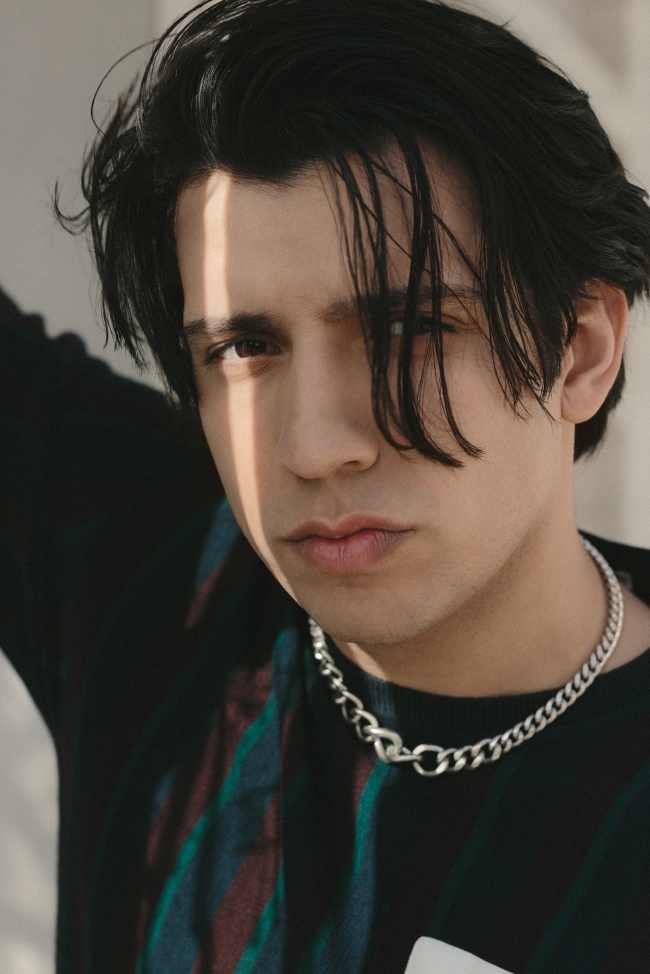
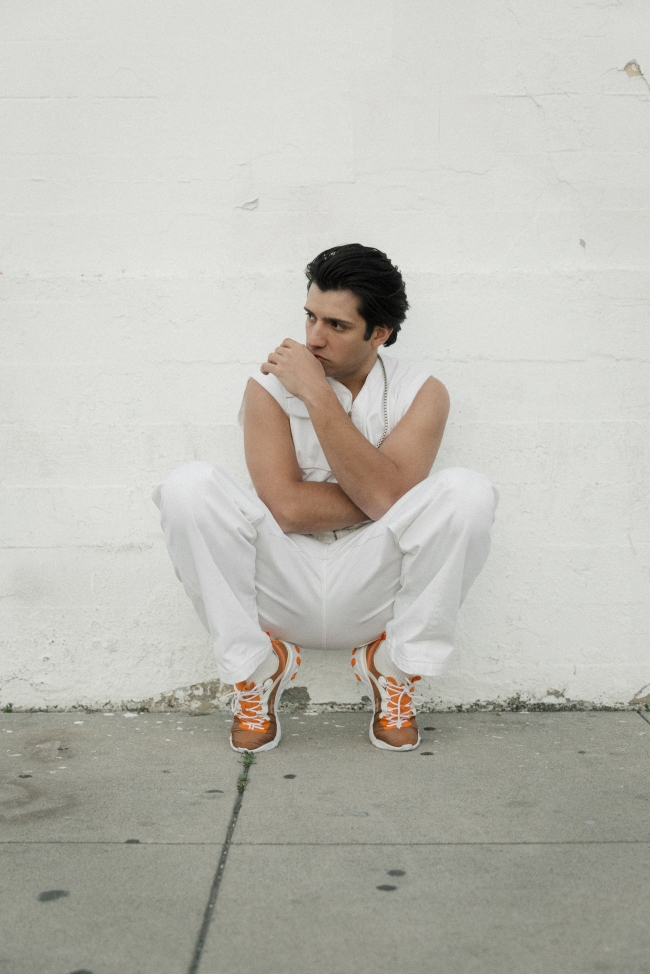
above left: Kevin wears jumper by Kent & Curwen and necklace stylist's own
above right: Kevin wears vest and trousers by Karl Kani and trainers by Nike
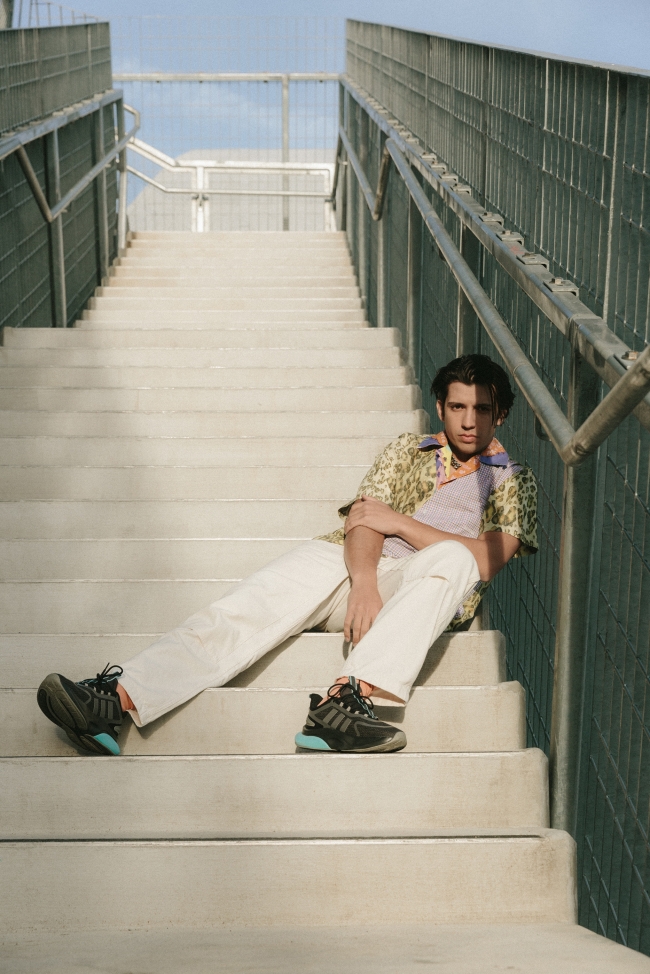
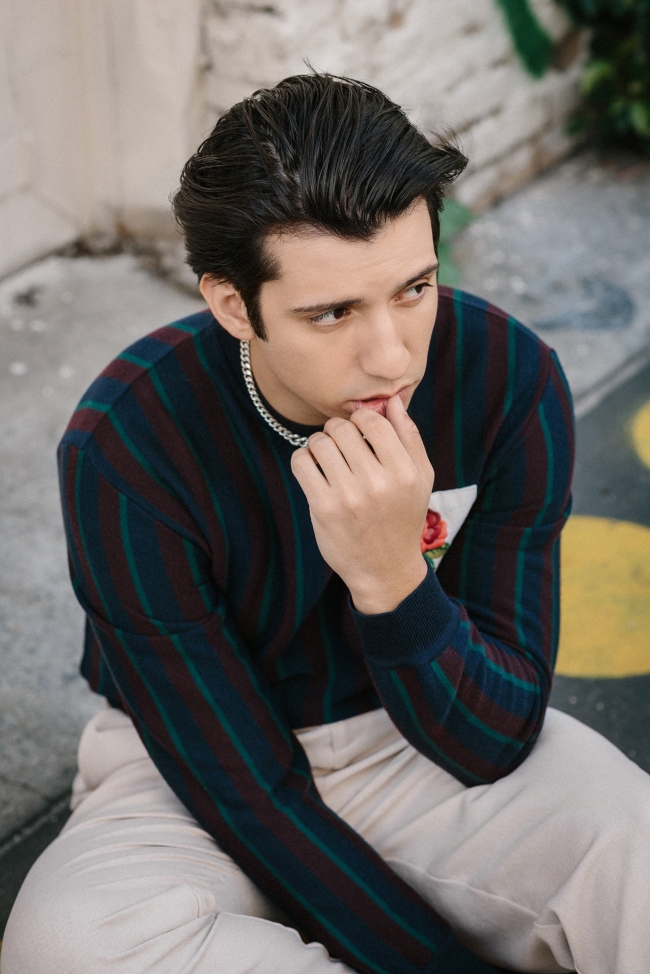
above left: Kevin wears shirt by Self Made, trousers by Studio Nicholson, trainers by Adidas and socks by OTAA
above right: Kevin wears jumper by Kent & Curwen, trousers by Our Legacy and necklace stylist's own
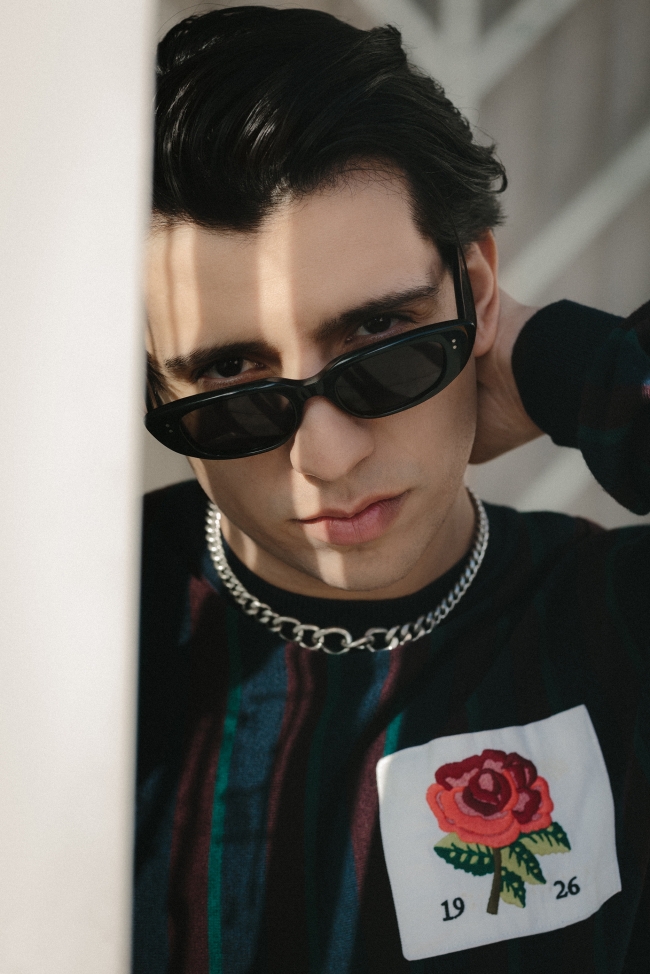
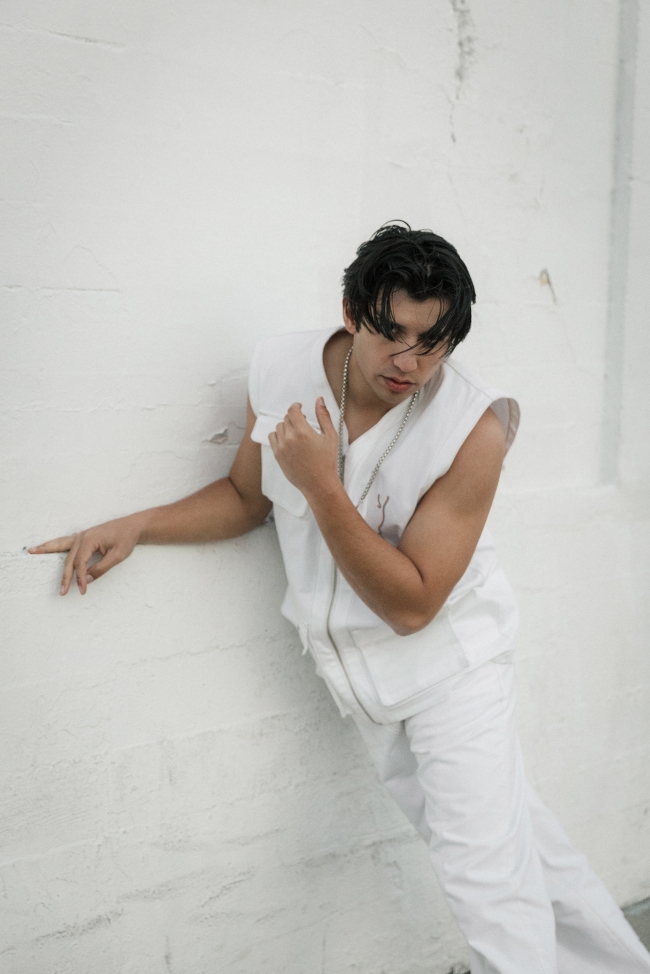
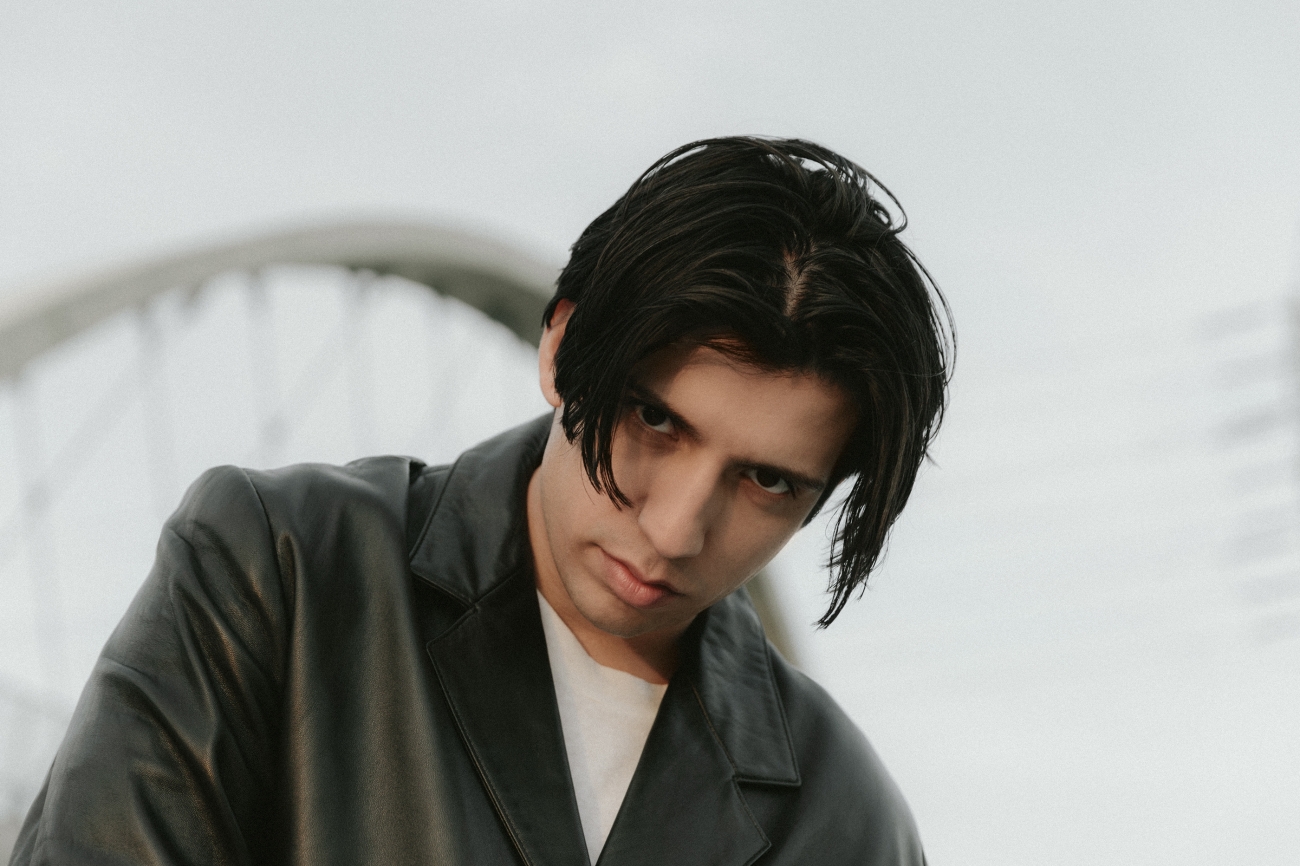
above: Kevin wears blazer by Saint Laurent and top by BDAC
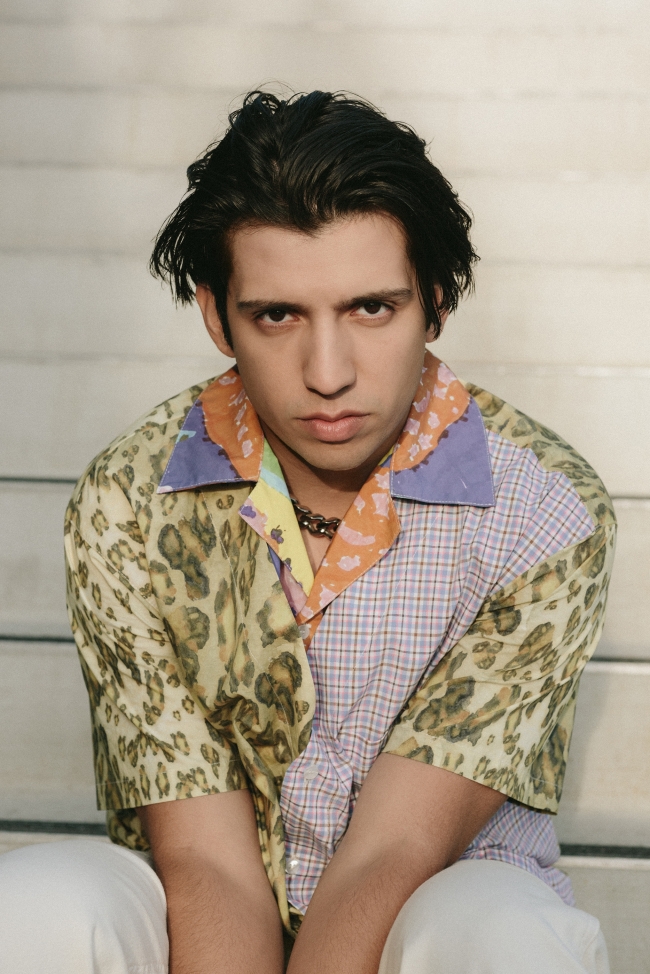
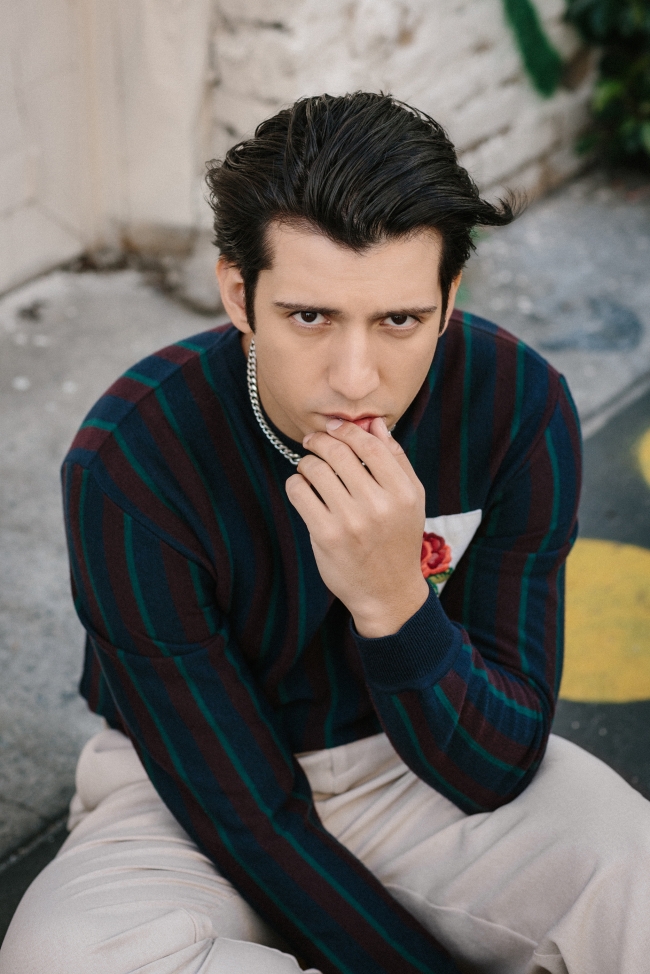
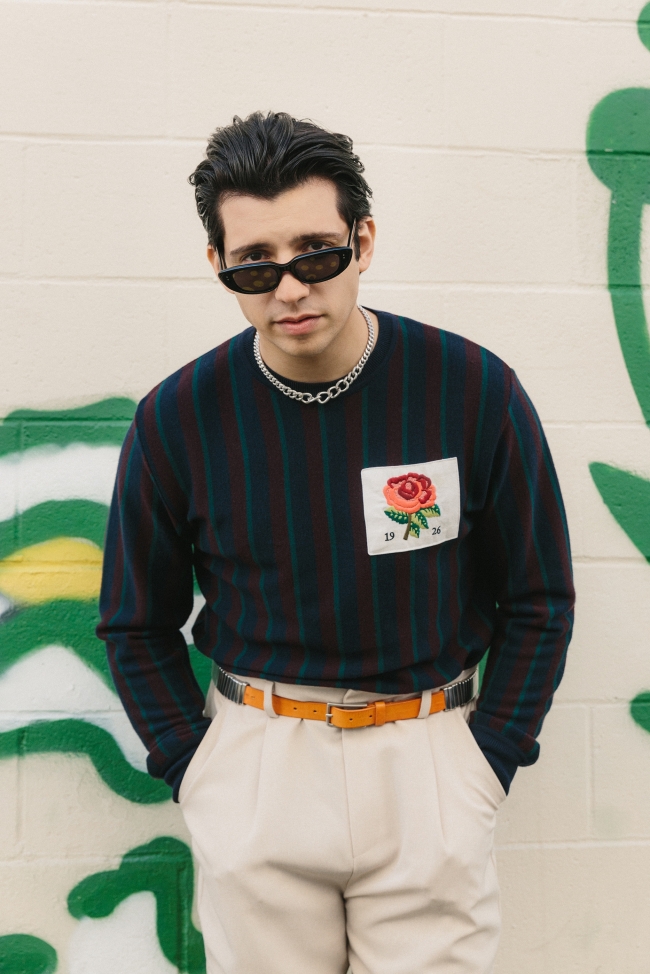
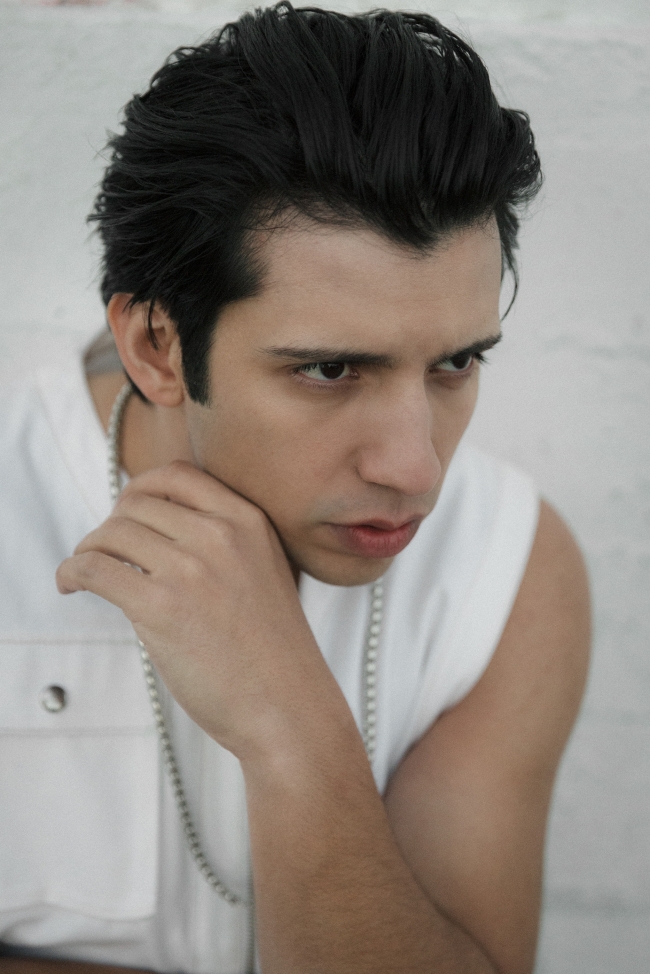
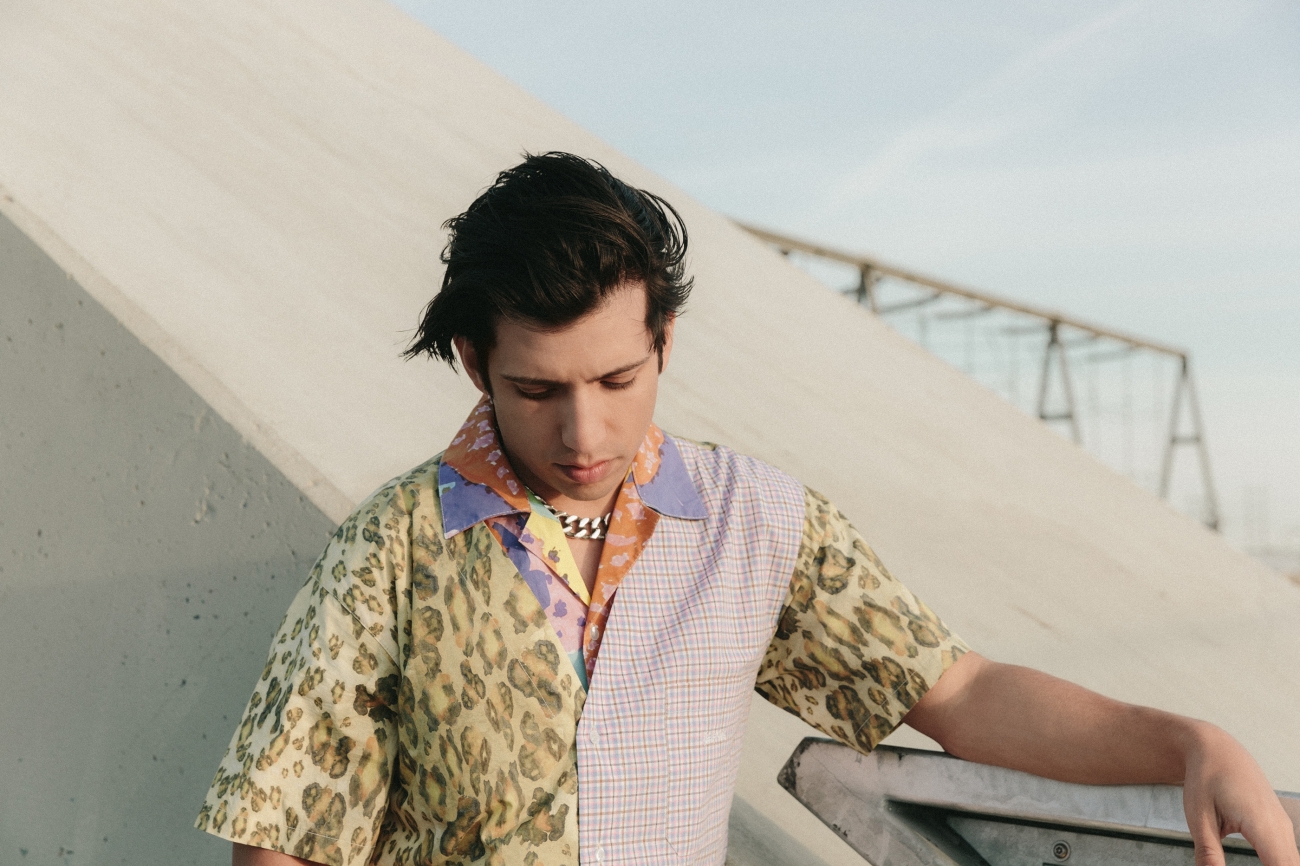
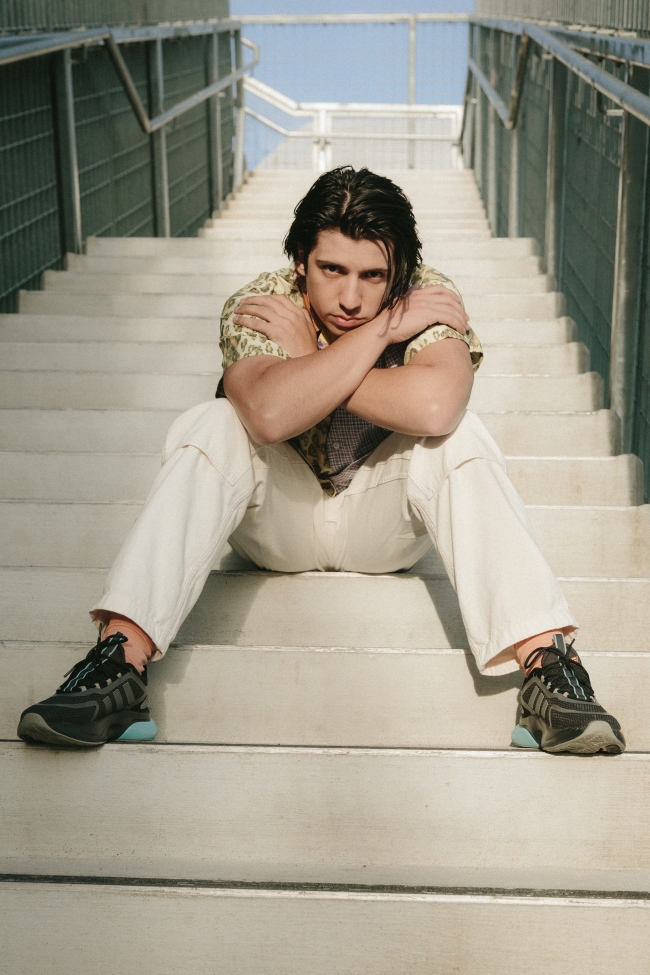
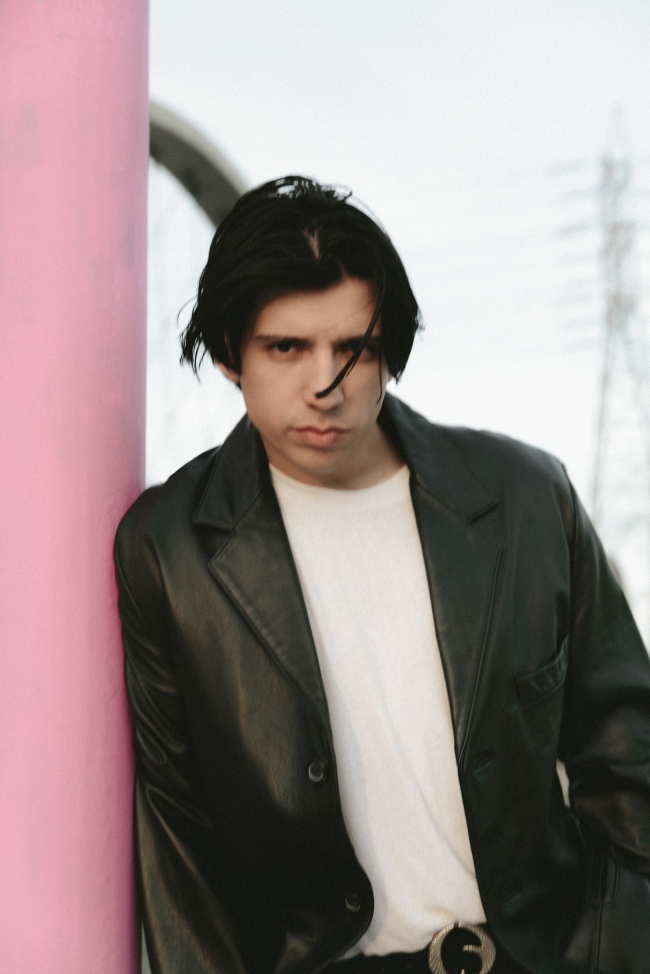
above left: outfit as before
above right: Kevin wears blazer by Saint Laurent, top by BDAC and belt stylist's own
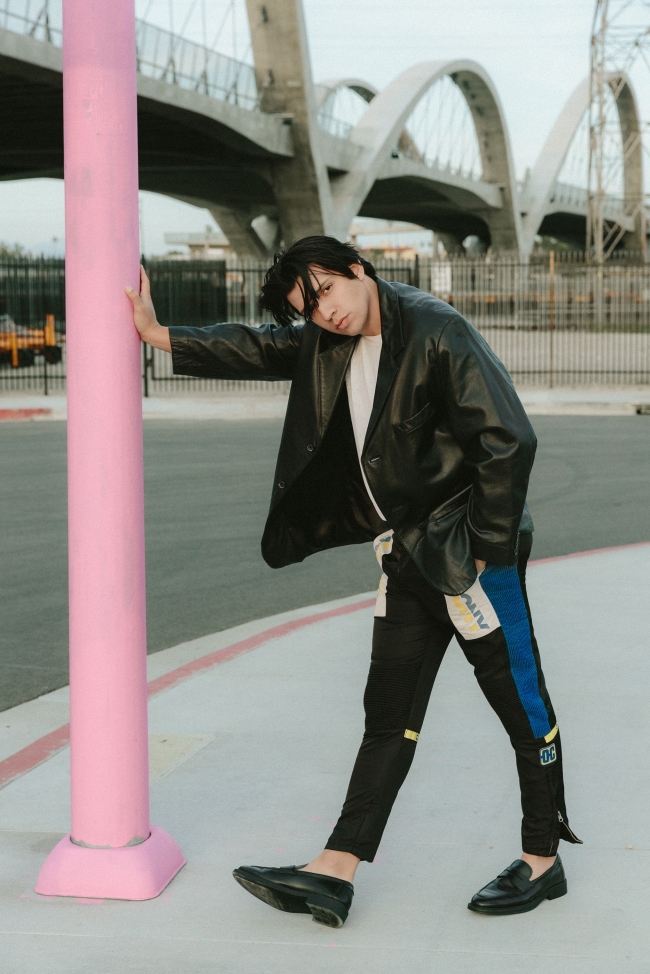
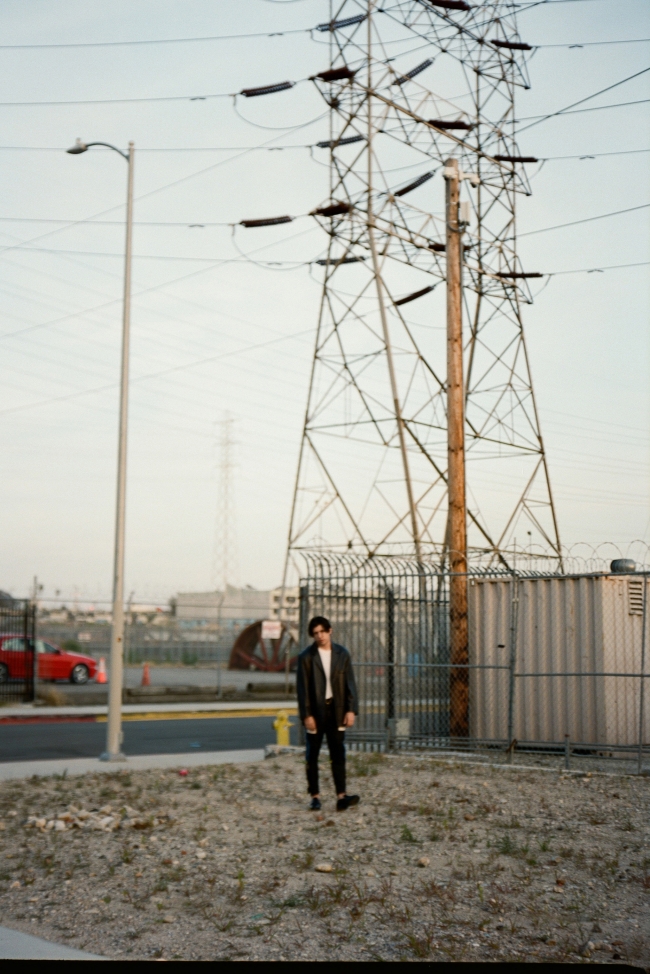
above: Kevin wears blazer and shoes by Saint Laurent, top by BDAC, trousers by Opening Ceremony and belt stylist's own
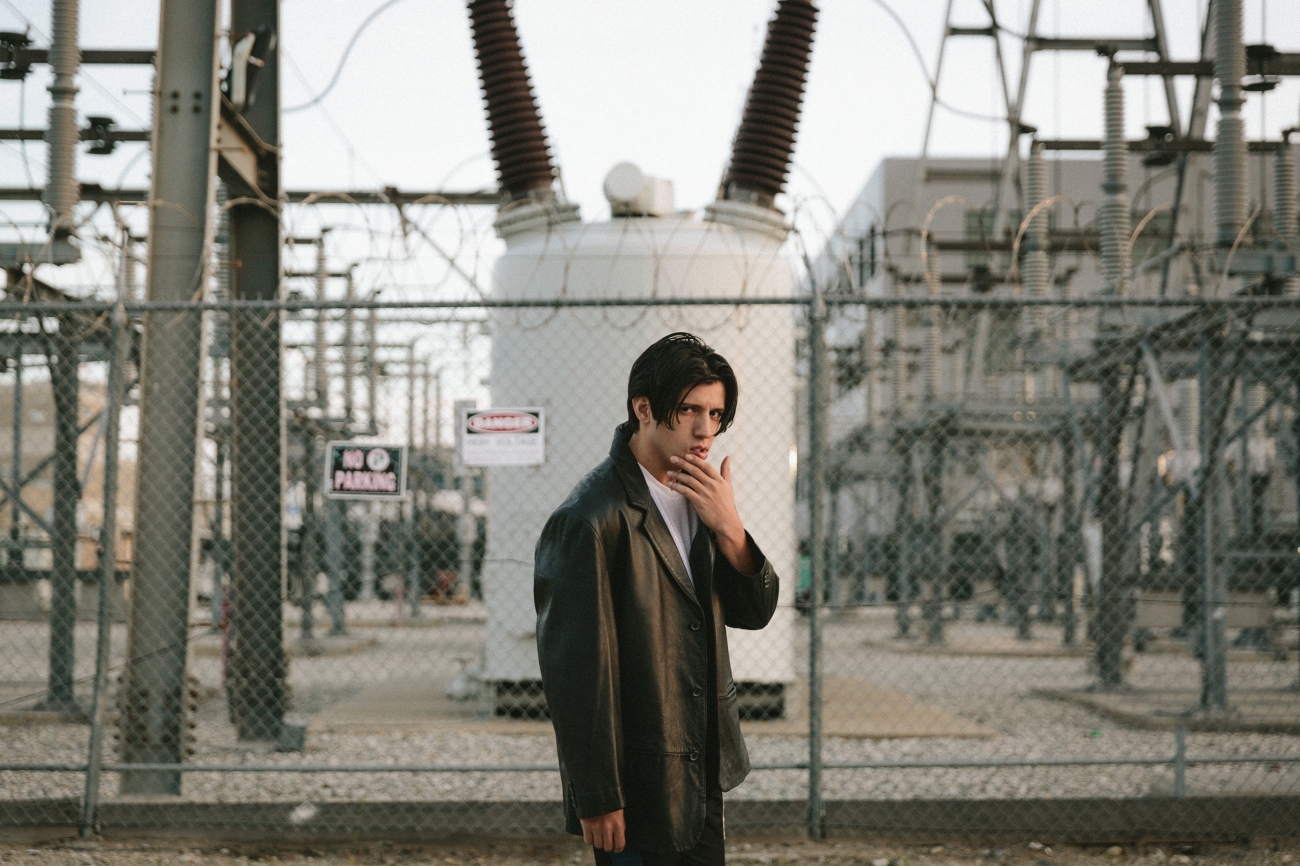
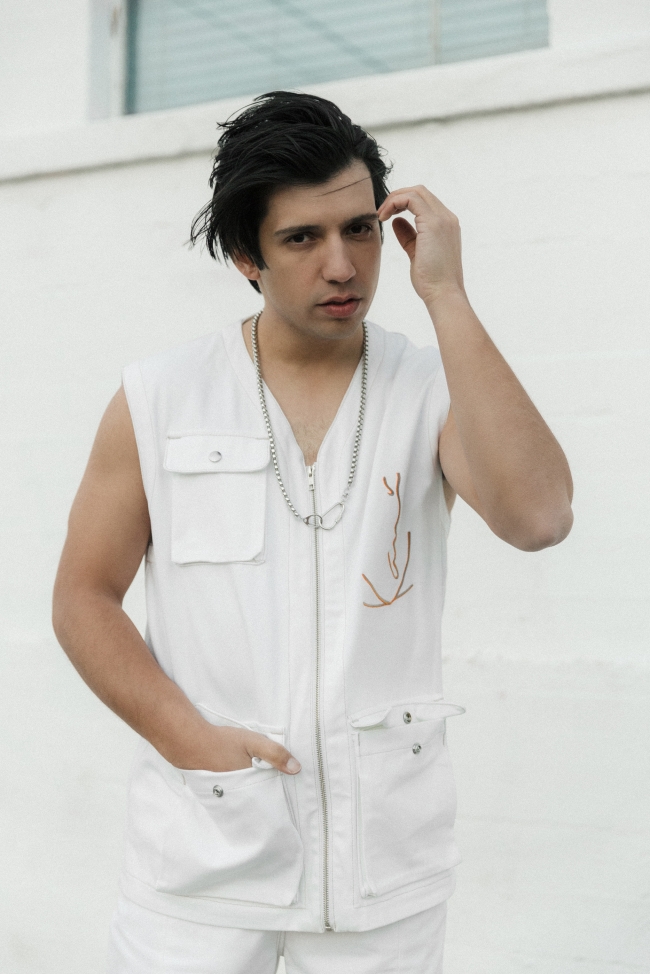
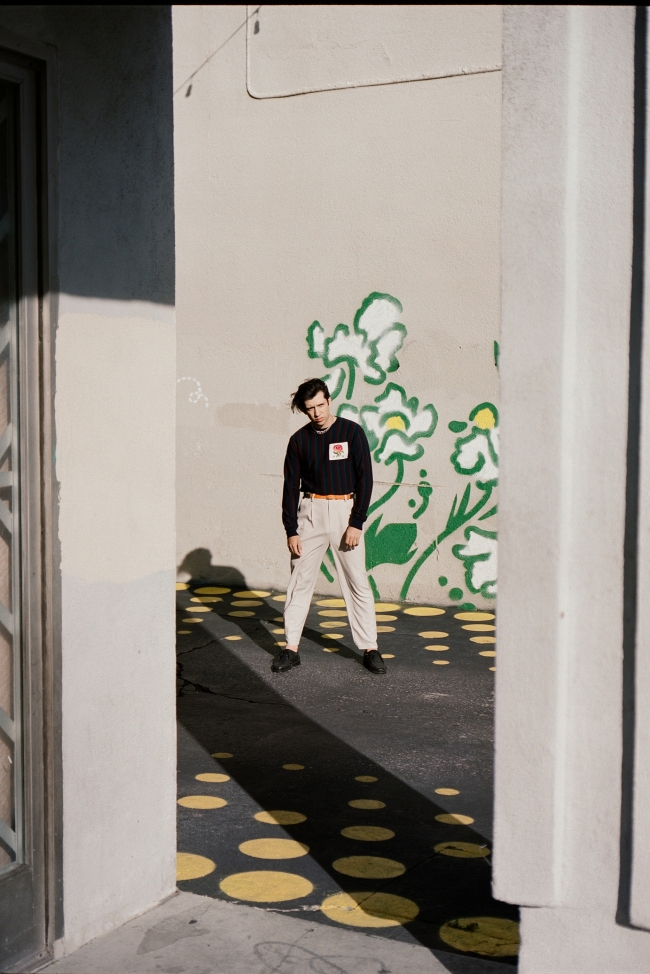
above left: outfit as before
above right: Kevin wears jumper by Kent & Curwen, trousers by Our Legacy, belt by Viktor & Rolf, shoes by Saint Laurent and necklace stylist's own
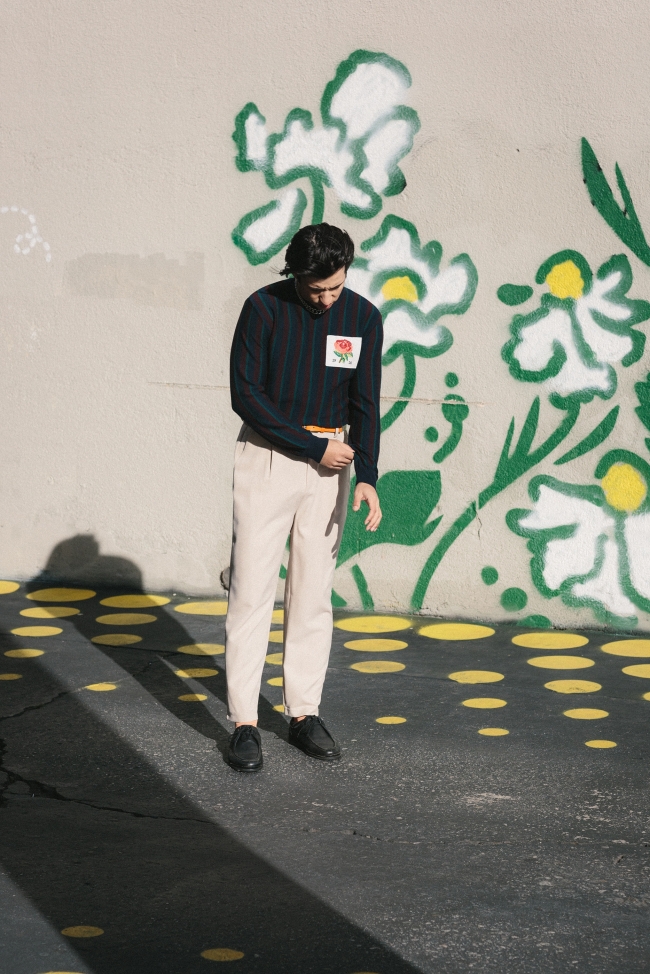
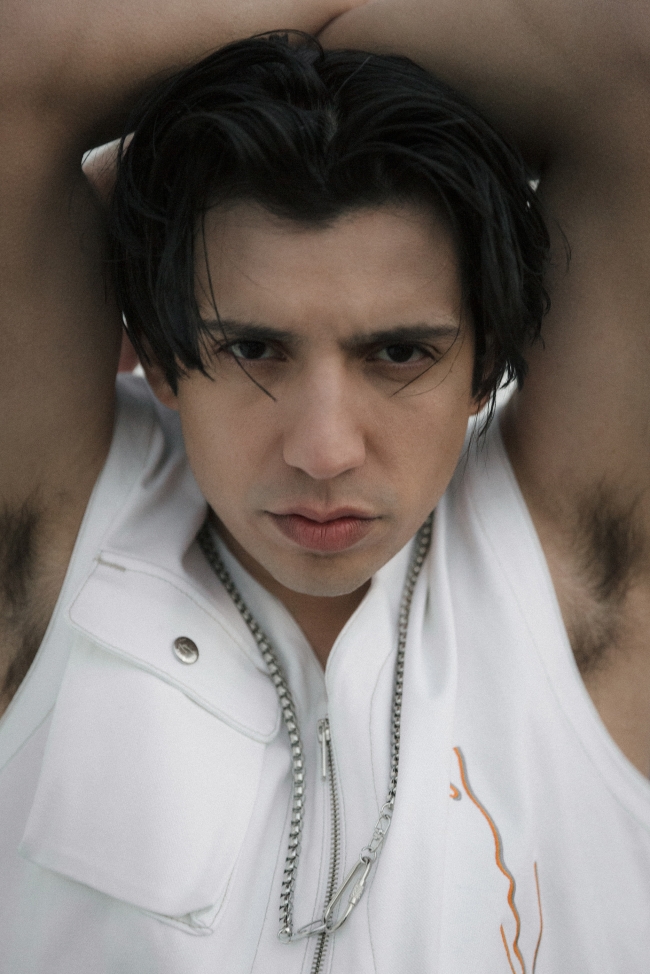
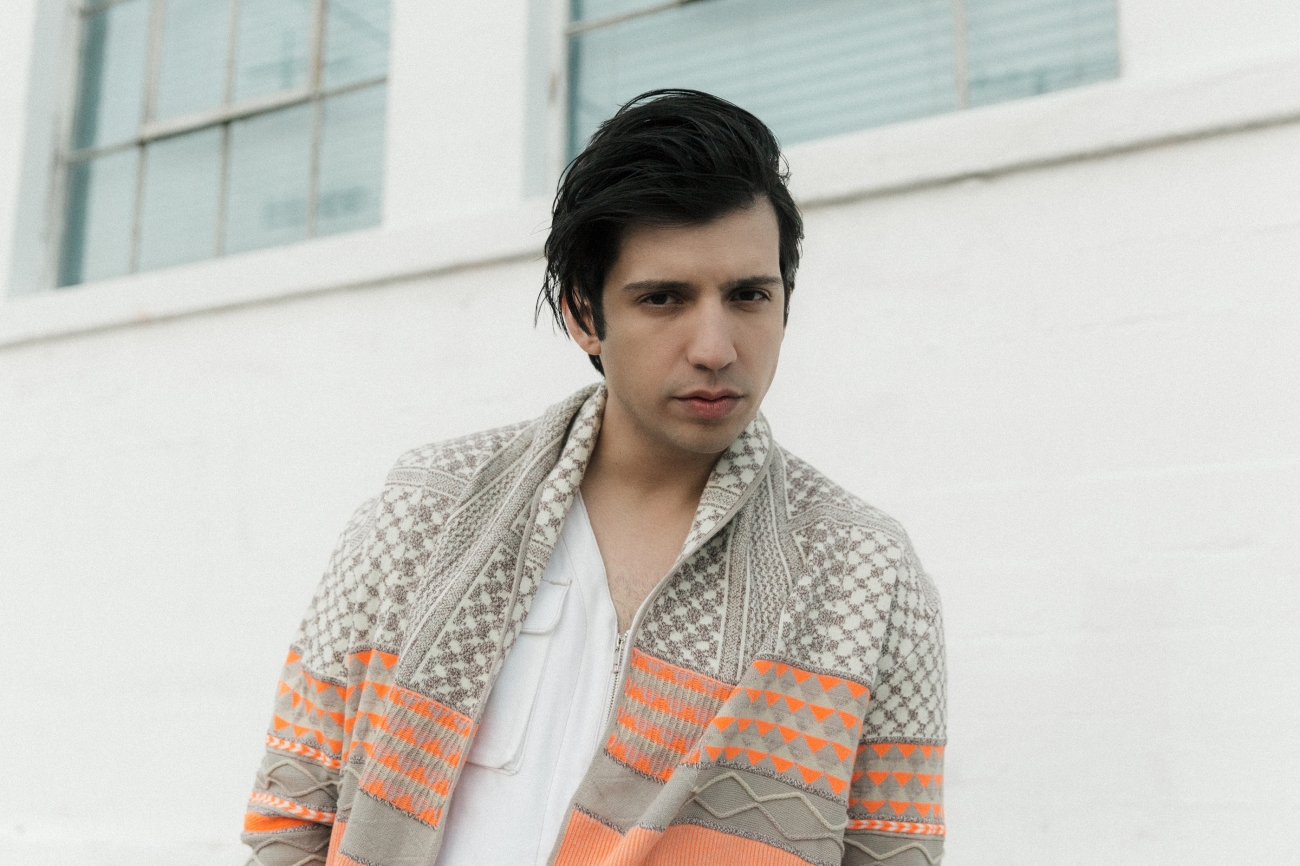
above: Kevin wears vest by Karl Kani and vintage cardigan
